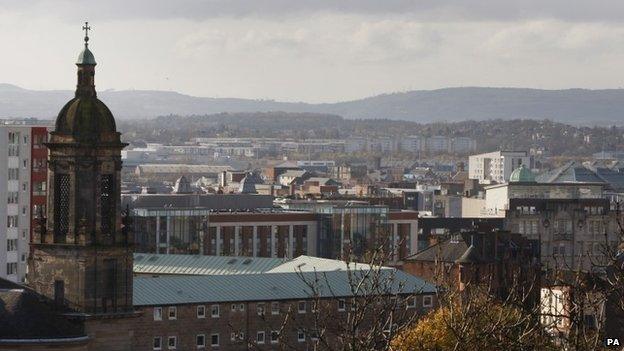Nick Clegg backs 'radical' English devolution plan
- Published
- comments
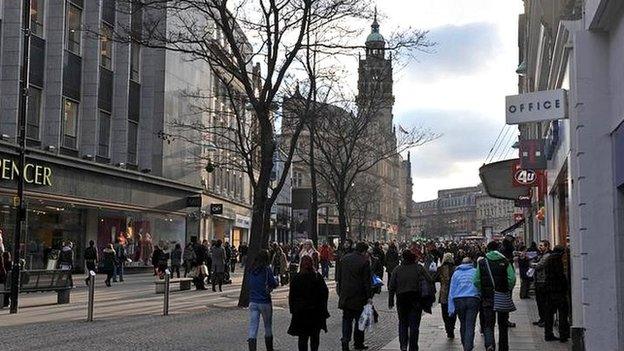
Sheffield is one of the 'core cities' identified as lagging behind London
Nick Clegg has said more power must be given to the English regions so they can truly "stand on their own feet".
The deputy prime minister argued such a move would be needed after the Scottish referendum, with new powers promised for Holyrood if there is a No vote.
While the focus in the past decade had been on devolution to Scotland, Wales and Northern Ireland, he said England was "the forgotten part of the puzzle".
Labour called on Mr Clegg to back up his "warm words" with substance.
But the Conservatives said so-called super authorities could "suck power" away from smaller councils and local communities.
UKIP leader Nigel Farage warned England was "being ignored" and said the UK must have a new constitutional settlement whatever the outcome of the Scottish referendum.
'Partial and piecemeal'
Speaking in Sheffield, Mr Clegg endorsed a report by the IPPR North think tank proposing a new wave of combined local authorities headed by directly elected "metro mayors".
He said councils were already able to retain more of their own income from business rates, but they should gradually take control of budgets for skills and job development.
"If ever there was a time to push for action on decentralisation, it's right now," he said.
"You only need look at how the Scottish referendum debate has re-energised people's interest and engagement in politics over the last few weeks to see that this is an idea whose time has come."
The IPPR North report, entitled Decentralisation Decade, external, says all but one of the biggest and most economically important English cities outside London - Birmingham, Bristol, Leeds, Liverpool, Newcastle, Nottingham, Sheffield and Manchester - have lagged behind the national average GDP per capita.
Only Bristol has bucked the trend.
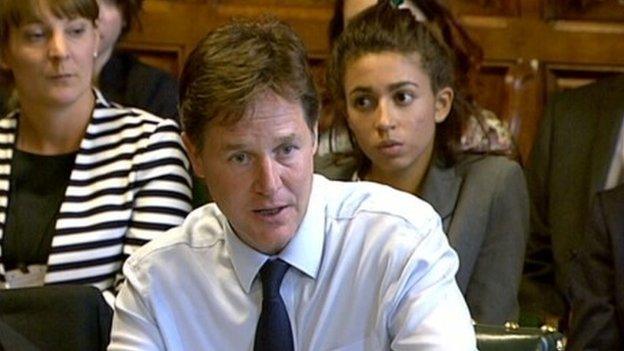
Nick Clegg believes more devolution is on its way
This is in stark contrast to Germany, Italy, Sweden and France where "so-called second-tier cities have been at the forefront of economic growth" and have even outperformed capital cities, says the report.
It also highlights growing public anger at "the Westminster bubble" and the "strong sense that democracy in the UK has been 'captured' by narrow networks of powerful but increasingly unaccountable elites".
It says the answer is decentralisation - handing tax-raising and spending powers to beefed-up local authorities covering larger areas, with directly elected mayors.
The report acknowledges the coalition government's efforts to decentralise power - through initiatives such as the City Deal, free schools and and police and crime commissioners - and Labour's recent calls for the creation of regional powerhouse authorities to drive growth.
But it says these steps have been "partial and piecemeal".
'Core cities'
The think tank's 10-year plan identifies 40 different functions of government - currently controlled by 13 different Whitehall departments - that it says should be devolved.
It says all local authorities should have full control over setting council tax bills - with the power to introduce new bands - and full control over the setting of business rates.
It also calls for a review of property taxes with a view to decentralising control of them and says 10% of the income-tax take in each of the combined authorities "should be assigned to those authorities".
'Re-energised'
IPPR North director Ed Cox said: "Whichever way Scotland votes next week, Edinburgh will get new powers and widen the gap with local leaders across England.
"England has waited patiently while Scotland, Wales and Northern Ireland have been given ever greater devolution. Now is the time to redress the balance."
Conservative Communities Secretary Eric Pickles said Whitehall had already relinquished power in many areas but there was further to go.
"Localism in England should be about devolving power to the lowest appropriate level - down to councils, to neighbourhoods and to individuals," he said.
"There may be some role for combined authorities on a strategic level to promote economic development and transport, but there is a real risk they will suck power upwards away from local councils and local taxpayers."
Mr Clegg said he did not believe an English Parliament was the answer because it would "create new talking shops for the political classes" and any decentralisation of power should be based on existing structures such as counties, cities and "combined authorities".
'Unstoppable tide'
Labour said it had already set out "detailed plans for the biggest decentralisation of power and funding for a century".
Shadow Communities Secretary Hilary Benn said: "There is now an unstoppable tide running in favour of passing power down, but Nick Clegg seems to be waking up late to the call for less centralisation.
"What people want is not warm words but substance to back it up."
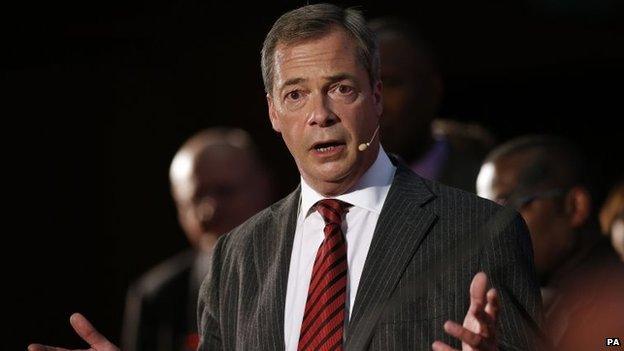
UKIP leader Nigel Farage backs a 'federal UK'
In a separate development, some of England's regional leaders, including Manchester Council boss Sir Richard Leese, Liverpool Mayor Joe Anderson and Bristol Mayor George Ferguson have joined forces to call for further devolution of power at a special "core cities" conference in London.
The eight cities - which have recently added Glasgow to their ranks - said they could create 1.2 million new jobs by 2030 if they got the decision-making tools.
"It isn't about moving the deck chairs around, it's about getting growth we wouldn't otherwise get," Sir Richard Leese told the meeting.
'Ignored'
Nigel Farage, who will campaign in Scotland later on Friday, joined calls for the English regions to be given some of the same powers being contemplated for Scotland. '
"At the moment, the English are feeling rather ignored in all of this," he told BBC Radio 4's Today.
"We have been talking about Scotland, Wales and Northern Ireland a lot over the last 16 , 17 years and a new constitutional settlement for a federal UK will suit everybody."
He said he was adamantly opposed to the break-up of the UK but he acknowledged UKIP had been wrong to oppose the setting up of the Scottish Parliament in the 1990s and he argued that the UK needed to accommodate the legitimate democratic and economic ambitions of its different nations.
"I think UKIP made the same mistake in the 1990s that the whole Westminster establishment has been making for 150 years.
"We resisted Gladstone's Home Rule bill (for Ireland) and we finished up losing a large chunk of Ireland which went up independent in the early 1920s.
"And we have done the same with devolution - I am fully in favour of a federal UK."
- Published9 September 2014
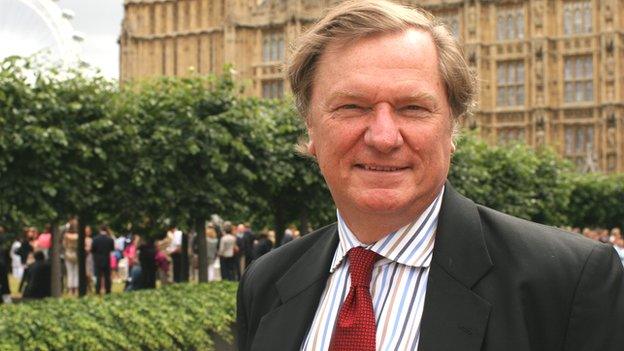
- Published1 July 2014
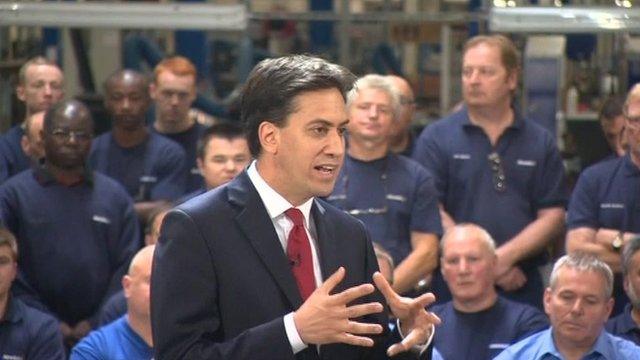
- Published8 September 2014
